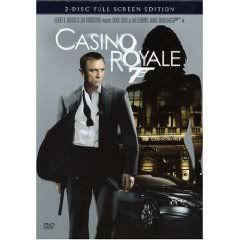When last we left him in 2002's Die Another Day, James Bond (Pierce Brosnan), armed with an invisible Aston Martin, a gun-toting Halle Berry at his side, had just defeated a face-changing Korean colonel and his giant space laser. If that description elicits more of a groan than a gasp, you're not alone. After forty-plus years of cinematic spectacle, it's easy to understand why Agent 007's recent adventures haven't done very much to leave expectant audiences shaken or stirred. It wasn't always like this, of course. There was a time when a James Bond movie represented the pinnacle of filmmaking -- both unceasingly innovative and wildly subversive at the same time. With their unparalleled technical prowess coupled with heaping helpings of violence, action, and innuendo, the early Bond films forged the path that nearly all commercial blockbusters follow to this very day. But then, that was a long time ago. By the time I watched my first Bond, 1979's Moonraker, the series was firmly ensconced in the (quite-successful, mind you) Roger Moore-era, and had long since traded in narrative trailblazing for a kind of baseline consistency and an insistent clinging to formulaic repetitiveness. And yet, there was something oddly reassuring about it. It was just one of those things. Every couple of years, you'd go to the theater, that strobe light/gun barrel opening would come up, and you'd watch 007 save the world yet again. It didn't have to be a good movie; it just had to be a Bond movie. Well, it's taken awhile -- several decades, in fact -- but with the release of Casino Royale, the 22nd film in the invincible series, we can finally, definitively say that the two are no longer mutually exclusive. James Bond is back, and as it turns out, he's been gone a lot longer than anyone even realized. As soon as the lights go down, before the opening credits even start, we know right away that something is different. What is it? That famous opening shot. The gun barrel motif that has signaled the beginning of every official Bond movie from 1962's Dr. No until now -- it's not there. And just like that, all our preconceptions of what to expect are kicked to the curb. When you think about it, the Bond producers have done something that's really unprecedented for a series as successful as this has been (each of the four Brosnan entries made more money than the last) -- they've dared to buck tradition and go in a new direction, winding the clock back for a Batman Begins-style reboot, giving us a ground-up look at James Bond's first mission. Taking its title and basic plotline from Ian Fleming's 1952 debut 007 novel, the film revolves around a high-stakes poker game that the wet-behind-the-ears Bond (Daniel Craig) is recruited to participate in against terrorist broker Le Chiffre (Mads Mikkelsen). It's a straightforward affair, with none of the standbys we've come to know and expect from these things -- no banter with Q, no fancy gadgets (nary an invisible car to be seen), no innuendo-laced banter with Miss Moneypenny, and an honest-to-gosh love story with new Bond girl Vesper Lynd (Eva Green) dropped down right smack in the middle. This is the Bond formula stripped bare, and every frame bespeaks the joy of rediscovery, with the gleeful abandon that comes with freedom from the stultifying sameness that has crippled this franchise for the past twenty-some years. As embodied by Daniel Craig, far-and-away the best actor to don the trademark tux since it was doffed by Sean Connery in 1971; the character is more meat-and-potatoes than caviar and escargot, and for the first time in seemingly ever we get a sense of the raw brutality and casual cruelty that drives him. Paradoxically, Craig also makes him far more real than he's ever been by also showing us a vulnerable side to this heretofore unshakable assassin. This is no easy task, as both Timothy Dalton and Brosnan before him tried and failed to lend some much needed gravitas to the usual 007 derring-do. At just under two-and-half hours in length, Casino Royale is longer, even, than the George Lazenby-starring On Her Majesty's Secret Service (one of the best in the series), and yet, from a breathless opening footchase in Madagascar to a cat-and-mouse game in Miami to a showdown in the canals of Venice, it remains utterly involving for its entirety. Much of the credit for this can go to star Craig, who electrifies from his first scene, as well as director Martin Campbell. Campbell, who also helmed Pierce Brosnan's 1995 007 debut, GoldenEye, also seems to have benefited greatly from the franchise's reinvention, employing a style here very clearly beholden to such recent spy outings as the Jason Bourne movies (as evidenced by a visceral bathroom brawl before the opening credits, depicting Bond's first kill). Ultimately, it's a bit of a wait before we finally hear Craig utter that most famous of lines -- "Bond. James Bond." -- the whole movie, in fact. But by the time he gets there, and by the time we first hear Monty Norman's "James Bond Theme," we realize that the usual promise at the closing credits that "James Bond Will Return," has finally transcended the constraints of the familiar and become something it hasn't been in quite awhile: something worth getting excited about.
